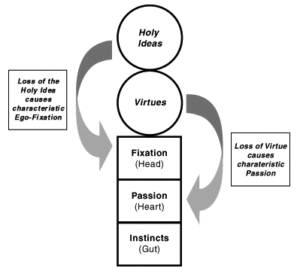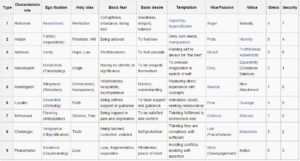According to Sandra Maitri, “The Enneagram can open the door to aspects of our personalities that we might find deeply disturbing, as well as to dimensions of ourselves beyond who we have historically taken ourselves to be, and so it is a very powerful, and in a sense, magical tool.”
However, the Enneagram is just a very powerful and accurate map. It is not intended to be a substitute for our direct experience of reality. The way to awakening and transforming our personality to our true nature is through on-going practice by using the Enneagram as a tool for self-observation on a daily basis and acting compassionately towards ourselves and others.
Otherwise, learning the Enneagram may do us and others more harm than good if we are using the new gained knowledge to justify ourselves for own patterns and behaviours, or manipulate others to meet our own needs and purposes.
The Loss of True Naure
Oscar Ichazo’s biggest contribution in the Enneagram is his discovery of human beings’ loss of perception of reality and corresponding distortions connected with the Enneagram symbol. He called the higher, essential qualities of the human mind the Holy Ideas. Each Holy Idea has a corresponding Virtue. The Virtues are essential qualities of the heart experienced by human beings when they are living in Essence. When a person loses awareness and presence, falling away from Essence into the trance of the personality, the loss of awareness of the Holy Idea becomes a person’s Ego Fixation, and the loss of contact with the Virtue causes the person’s Passion.
All of us has the capacity to embody all of the Holy Ideas and Virtues, our personality is just our way to recreate the loss of our true nature in a self-defeating way. The diagram and table below illustrate the connection of our higher self and our personality.
From Ego Fixations to Holy Ideas
Ego Fixations: indication of how we are fixated or “stuck” in the way we deal with life, resulting from the loss of the Holy Idea.
Holy Ideas: an antidote to the struggle of each type (ego fixation).
Type 1
Resentment comes from feeling an obligation to do the right thing while others seem to get away with shirking that responsibility.
Perfection aligns with a universal sense of perfection where the individual sense of perfection need not be forced upon the world.
Type 2
Flattery represents the tendency to pay compliments or special attention to others in order to manipulate oneself into their favour.
Freedom or Will aligns with a less ego-centric approach to the needs of others without covertly manipulating others in order to feel liked, needed, or have one’s own desires met.
Type 3
Vanity places great emphasis on one’s appearance, qualities, abilities, achievements, etc. in order to feel validated.
Hope or Law points to a universal harmony or flow of things where one doesn’t need to outdo in order to prove one’s worth.
Type 4
Melancholy surrounds a lack of emotional fulfillment that longs for what isn’t and disparages what is.
Origin points to an inherent unfolding of one’s own uniqueness in the universe without having to distinguish oneself by cultivating that uniqueness.
Type 5
Stinginess hoards resources and minimizes needs in an attempt to compensate for a world that seems to take more than it gives.
Omniscience is knowledge of the world through participation and experience in it instead of watching from the sidelines in the hope of understanding it before jumping in.
Type 6
Cowardice is the tendency to succumb to or challenge fears or doubts that arise from an uncertain mind.
Faith draws from a belief that the universe eventually works itself to a resolution and trust in that means moving forward even in uncertainty.
Type 7
Planning lives in future anticipation of more enjoyable alternatives to boring, uncomfortable, painful, or limiting situations.
Wisdom or Plan experiences a complete reality by embracing both the positive and negative instead of escaping into what’s more enjoyable.
Type 8
Vengeance experiences the world as taking advantage of the vulnerable and a reminder to stand strong and assertive against it.
Truth sees the gray of a universal truth which lies between the black and white absolutes of the individual’s truth.
Type 9
Indolence arises from the negation or forgetfulness of one’s own agenda in order to go along with the agenda of others.
Love holds that every being in the universe has value and significance both as part of something greater and as an individual.
From Passions to Virtues
Passions: an underlying habit of emotional energy, resulting from the loss of the Virtue.
Virtues: What is lacking or needed to compensate for the corresponding passion, and dissolves its emotional demands.
Type 1
Anger is an energy that arises in service of correcting things that don’t match an internalized sense of rightness. It can be noticed in the form of criticism of things not being done correctly.
Serenity arises when the world is accepted as it is. Critical anger finds no target when the world is not in need of being corrected.
Type 2
Pride is a self-inflated feeling of importance in the lives of others, coming from a feeling of being needed or indispensable in some way. Often it arises out of the belief that I have no needs but am able to satisfy the needs of others.
Humility arises when the self is seen as no more or less important than others. The self-inflation of pride gives way when you realize you’re not as indispensable as imagined.
Type 3
Deceit is a packaging of oneself in order to successfully sell oneself to others. The authentic self aside from the packaging is often lost in the image produced by the presentation.
Truthfulness arises when the true self is accepted. The packaging and selling of oneself becomes unnecessary when there is no reason for deceitful appearances.
Type 4
Envy notices how others have what I don’t because others are more capable than I am. It’s a comparison of the positive in others with the negative in the self.
Equanimity arises when you see both your positive and negatives equally. The half-truth of envy loses its validity when you stop comparing the positives of others with the negatives of the self.
Type 5
Avarice is a greed not for wealth but for time and space to process the world through the intellect. It’s a response to a world that can seem at times intrusive, chaotic, and overwhelming.
Non-attachment from isolation arises when you learn the world is better understood by participating in it. Avarice for space and time often makes one less prepared to live in the world not more.
Type 6
Fear is often a generalized mistrust of what and how others are thinking. This may be put at rest by a questioning in search of certainty or an action that confronts the perceived fear.
Courage arises when negative possibilities are seen as a product of the mind and not reality. Action against or away from fear becomes irrelevant when the fear is seen as self-created.
Type 7
Gluttony of the mind is a desire to taste life in all its offerings. The mind imagines an endless stream of appealing possibilities with the challenge of how to experience them all with limited time.
Sobriety arises when it’s realized that a more meaningful and deeper experience of life is missed when it’s superficially sampled. Gluttony of the mind racing through life pursues a quantity of life forsaking a quality of life.
Type 8
Lust or Excess is one of pursuing intensity or honesty of experience that feels more real and energizing. For others this intensity is often felt as too much, requiring the type 8 to sit on the energy so as not to overwhelm others.
Innocence arises when the more subtle sensations and emotions are allowed to surface. Excesses and intensity of experience are needed only when one is unable to appreciate or experience the subtleties of life.
Type 9
Indolence or Laziness is an inertia seeking and maintaining comfort, averse to conflict and disruption. It’s losing oneself in routines or activities that allow one to just be without having any goals to strive for or expectations to meet.
Action allows one to live and pursue one’s goals and desires. Laziness or inertia that depends on others for direction leads to a life not fully lived for oneself.


